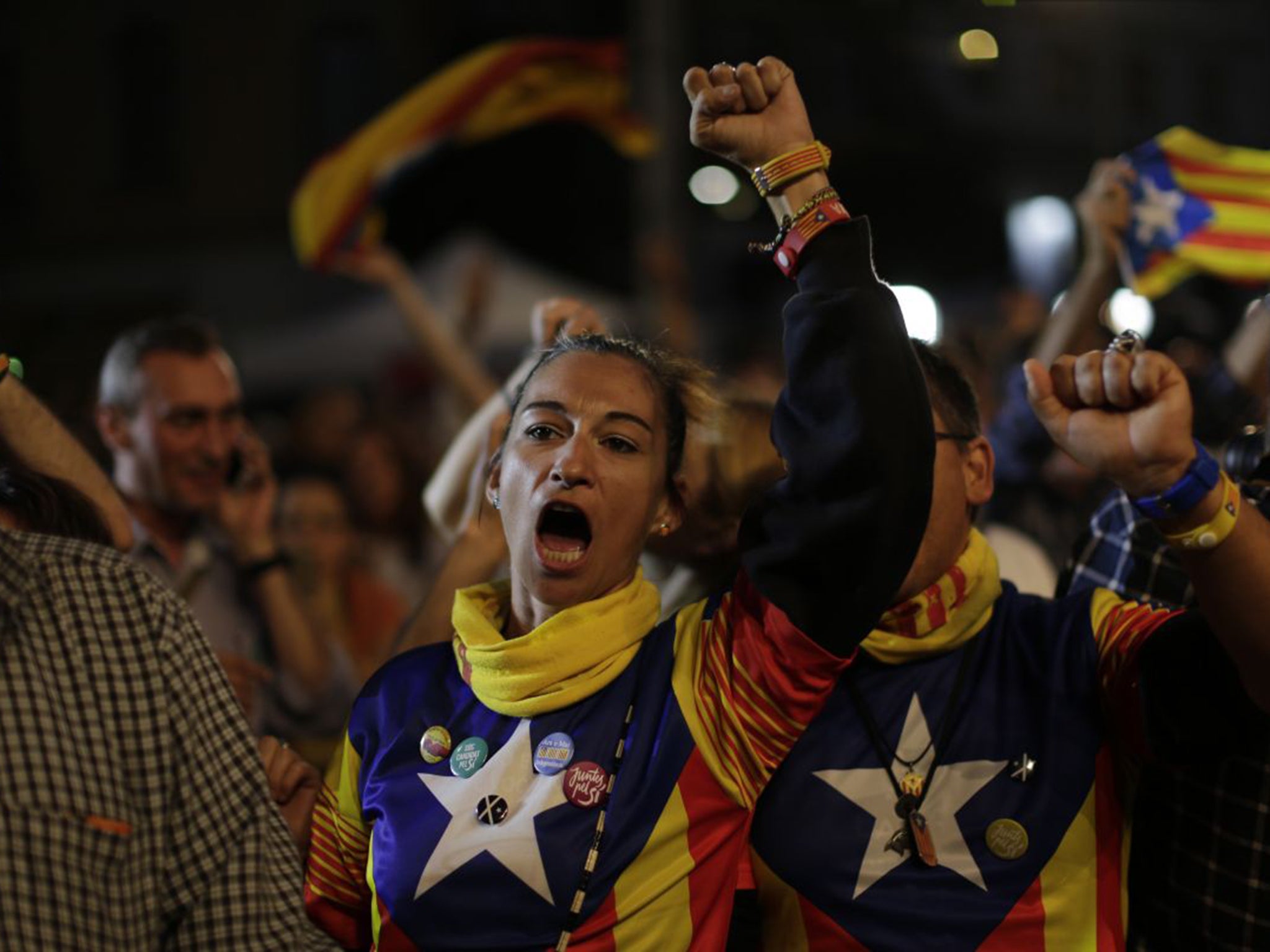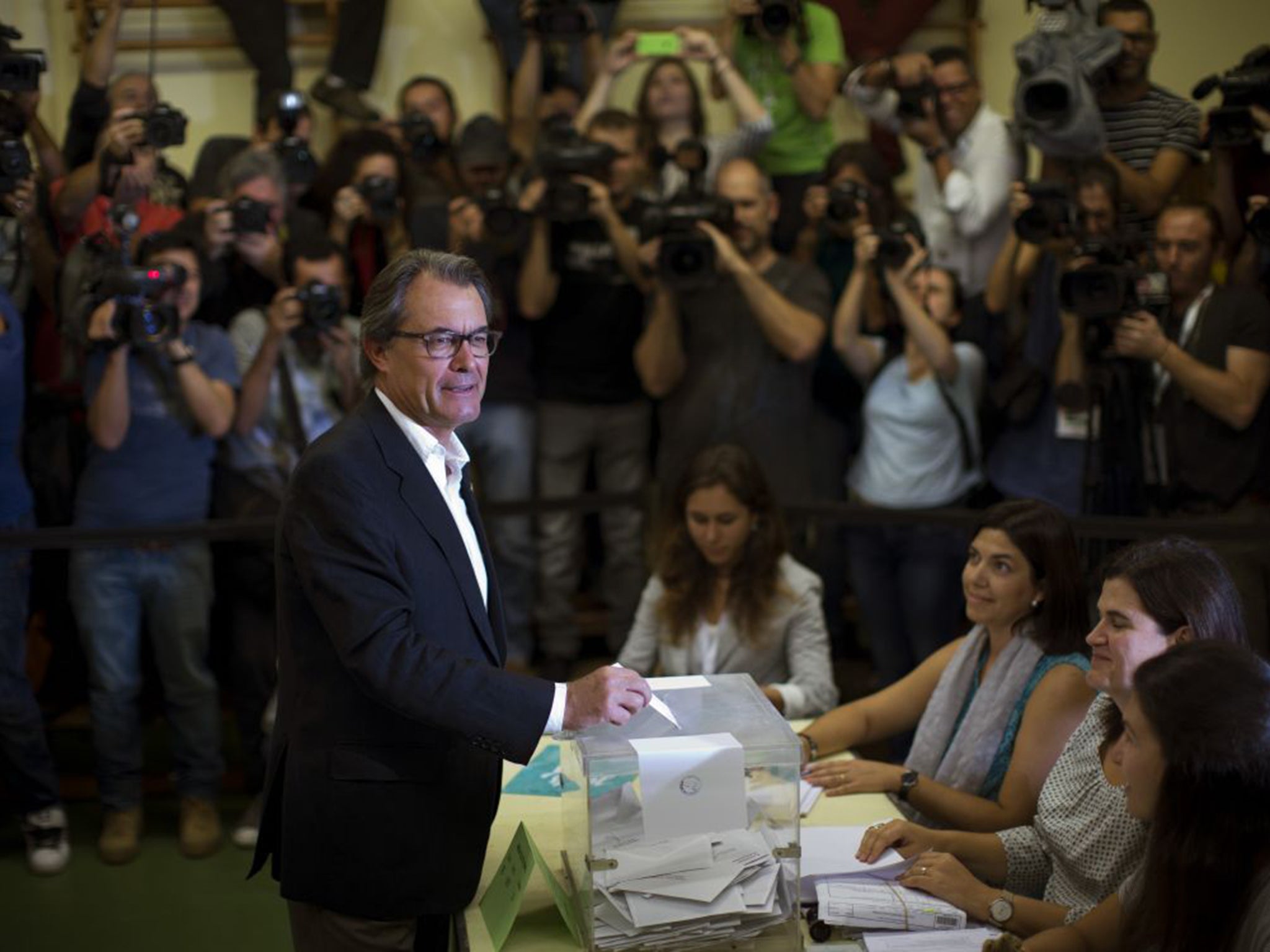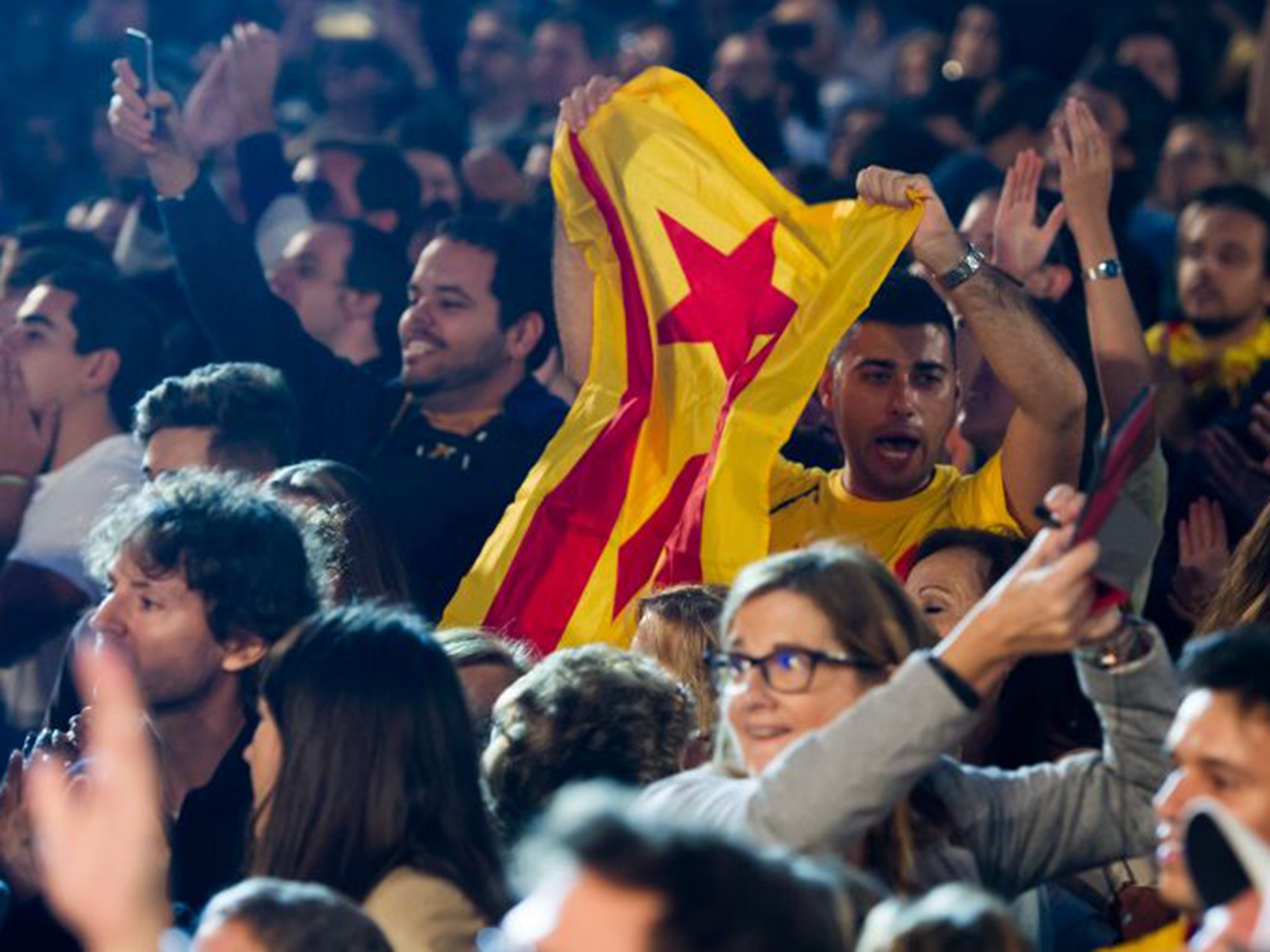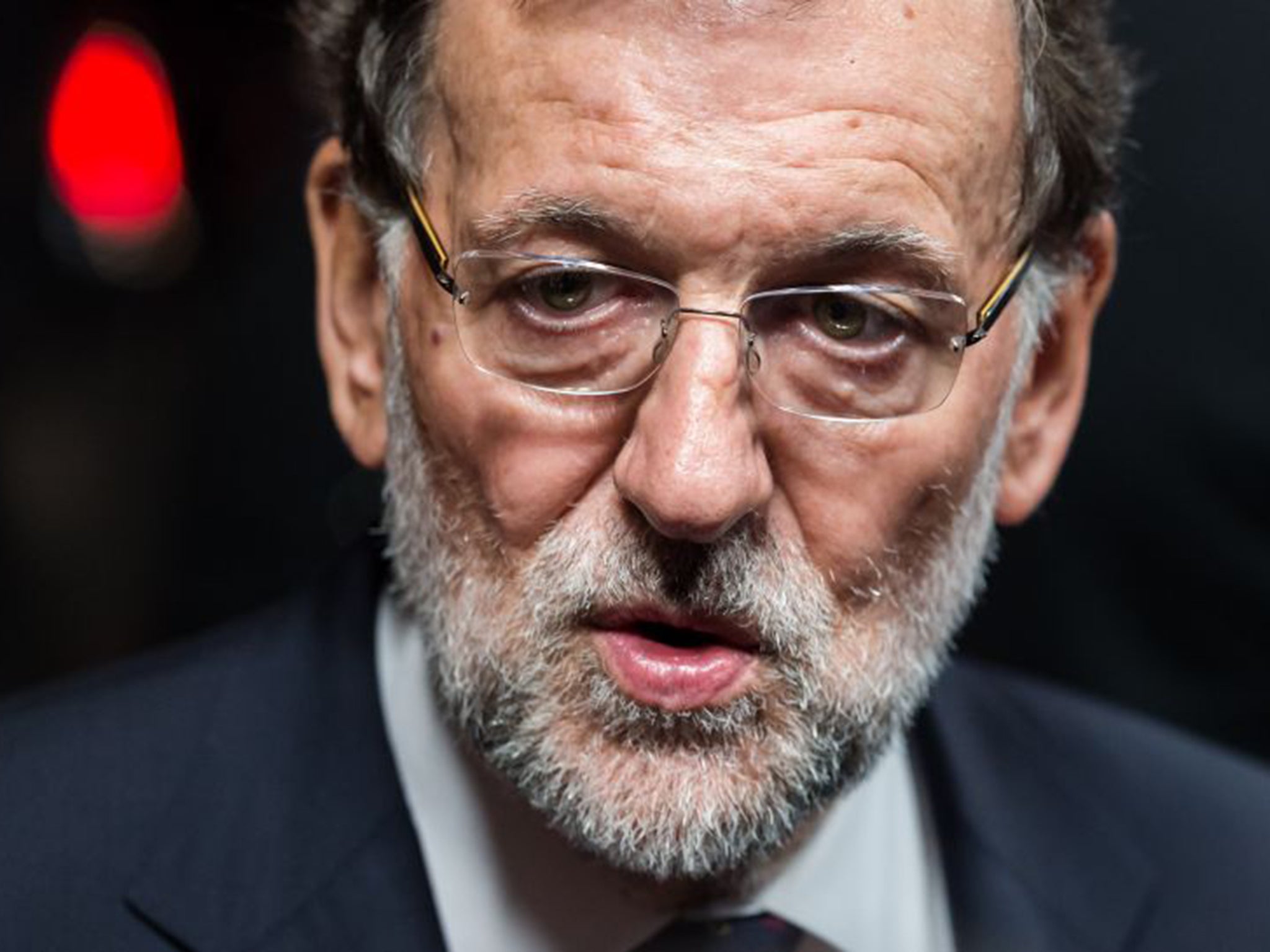Catalonia pro-independence parties on course for victory in elections
Catalonia’s pro-independence parties on course for victory with record turnout in vote which is likely to pose huge constitutional difficulties for Spain

Your support helps us to tell the story
From reproductive rights to climate change to Big Tech, The Independent is on the ground when the story is developing. Whether it's investigating the financials of Elon Musk's pro-Trump PAC or producing our latest documentary, 'The A Word', which shines a light on the American women fighting for reproductive rights, we know how important it is to parse out the facts from the messaging.
At such a critical moment in US history, we need reporters on the ground. Your donation allows us to keep sending journalists to speak to both sides of the story.
The Independent is trusted by Americans across the entire political spectrum. And unlike many other quality news outlets, we choose not to lock Americans out of our reporting and analysis with paywalls. We believe quality journalism should be available to everyone, paid for by those who can afford it.
Your support makes all the difference.The longlasting political standoff between Spain’s central government and the country’s richest region of Catalonia intensified to new levels as Catalonia’s pro-independence parties secured a narrow majority of seats in regional elections to kickstart their bid to break away from Spain.
Victory is expected to act as a green light for Catalonia’s secessionists to unveil a route map towards a unilateral declaration of independence by 2017.
The pro-separatist win sees around 72 of 135 regional parliamentary seats captured by the Junts Per Si (Together for Yes) coalition of two main independence parties, the ERC and CDC - and would mean that voters have ignored warnings by the Prime Minister Mariano Rajoy against supporting secession.
Mr Rajoy can draw comfort from the fact that although Catalonia’s proportional representation voting system is weighted in such a way that it has seen the independence movement garner a majority of seats in parliament, rather less than 50 per cent of Catalans have actually voted in favour of breaking away from the rest of the country.
In the Born Cultural centre in downtown Barcelona on Sunday evening, independentists supporting the Junts Per Sí coalition gathered to celebrate, wave estelada Catalan flags and chant - in Catalan - "A Single People" as the results confirming their victory came through.

“The ‘Yes’ [for independence has won] in votes and in seats,” claimed Oriol Junqueras, the leader of the ERC party when he took to the stage to confirm the Junts Per Sí narrow triumph.
“In the eyes of the world we’ve been working for a mandate for independence and tonight, after so much hard work, we’ve got it. We’re writing one of the most glorious pages of our history. Long live Catalonia!”
On the pro-secession side, whilst the coalition of parties in Junts Per Si dropped from their combined 2012 total of 71 seats to 63, their allies in the hard left pro-independence party CUP increased its total from three to up to 10.

On the pro-Spanish unity side, big winners were the centrist party CS, whose previous total of nine seats has nearly tripled to 25, making it the main opposition party.
Mr Rajoy argued earlier this week that a pro-separatist victory would cause dangerous tension between Spain’s richest region and the rest of the country, and that an independent Catalonia would automatically be cast out of the European Union and would be at the back of the queue to rejoin.
Instead voters have favoured the breakaway plans proposed by the Catalan President, Artur Mas, whose CDC party has fought the campaign as part of a wider Junts Pel Si (Together for Yes) coalition. Mr Mas promised that if pro-separatist parties were to win, he would form a transitional government building towards independence, with a formal declaration that the process has begun later this week.
Whatever happens and whoever wins, we’ll end up squabbling
“We have a great deal of work to do,” Mr Mas told his supporters on Sunday evening, “but we have a great deal of strength and legitimacy to drive this project forward. And we will do it.”
As an emotionally charged election day drew to a close, the total number of votes cast looked to be heading for a record turnout. At 6pm – two hours before polling stations closed – 63 per cent of Catalans had voted.
A Catalan government delegate confirmed that postal votes were also up by 56 per cent compared to the last regional elections. The warm, dry weather throughout the region may have helped voter turnout, but politicians pushing for a split from Spain said the general conception of the exceptional importance of this year’s regional elections had been the key factor.
“It’s logical that there’s a lot more participation. I have never had to wait in such a long queue to vote,” said Mr Mas.
With seven main parties to vote for, ranging from the hard-left, pro-independence CUP to Mr Rajoy’s right-of-centre pro-Spanish unity Partido Popular, the big turnout has highlighted the deeply fragmented nature of Catalan politics.
Catalonia’s bid for independence, despite gaining unprecedented momentum over the last four years, has met with fierce opposition from Mr Rajoy, who has called it “nonsense” and repeatedly pointed out that Spain’s constitution does not allow for breakaway states. “There is a majority of Catalans who love their people and love their land and do not wish to see it amputated from Spain and Europe,” he said recently. Spain’s central bank had also warned against the independence drive, saying it could risk exclusion from the EU, whilst other Spanish lenders have said it could threaten financial stability just as Spain emerges from a bitter recession.

Looming over this all are Spain’s national elections, widely predicted to be held on 20 December. Independence supporters are hoping that at the very least, a future government more open to negotiations may end the stand-off between Madrid and Catalonia.
One of the most sombre predictions of Catalonia’s political future came from a 103-year-old voter named Dolores. “Whatever happens and whoever wins,” she told El País newspaper, “we’ll end up squabbling.”
Join our commenting forum
Join thought-provoking conversations, follow other Independent readers and see their replies
Comments